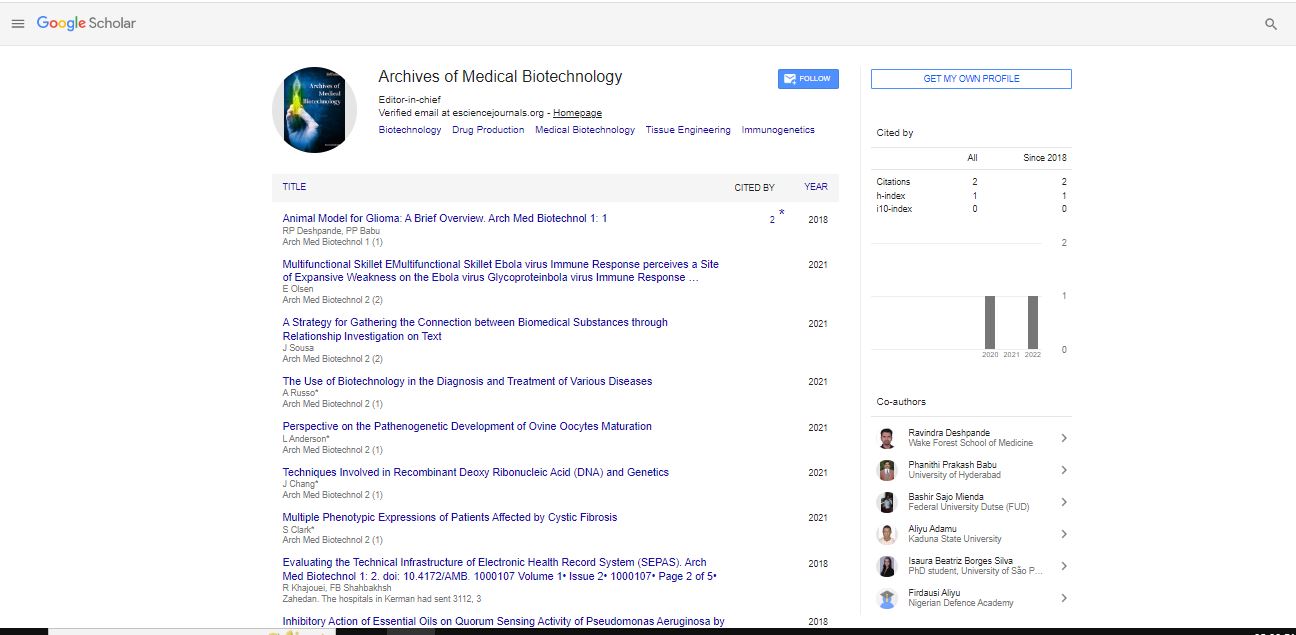Commentary, Arch Med Biotechnol Vol: 4 Issue: 2
Gene Therapy in the Treatment of Genetic Disorders
Aldeno Chang*
Department of Medical Genetics and Genomics, Zhejiang Children's Hospital, Zhejiang University School of Medicine, Hsangzhou, Zhejiang 310058, China
*Corresponding Author: Aldeno Chang,
Department of Medical Genetics and Genomics, Zhejiang Children's Hospital, Zhejiang University School of Medicine, Hsangzhou, Zhejiang 310058, China;
E-mail: aldenochang@ufu.cn
Received date: 22 May, 2023, Manuscript No. AMB-23-106370;
Editor assigned date: 24 May, 2023, PreQC No. AMB-23-106370 (PQ);
Reviewed date: 16 June, 2023, QC No. AMB-23-106370;
Revised date: 26 June, 2023, Manuscript No. AMB-23-106370 (R);
Published date: 03 July, 2023 DOI: 10.4172/amb.1000050.
Citation: Chang A (2023) Gene Therapy in the Treatment of Genetic Disorders. Arch Med Biotechnol 4:2.
Abstract
Gene therapy is a promising approach in the field of medical biotechnology for the treatment of genetic disorders. This manuscript provides an overview of gene therapy and its potential applications in treating genetic diseases. It discusses the different types of gene therapy techniques, such as viral and non-viral vectors, and highlights their advantages and limitations. The manuscript also presents examples of successful gene therapy treatments for various genetic disorders and explores the challenges and ethical considerations associated with this emerging field. Overall, gene therapy holds great potential for the treatment of genetic disorders and offers hope for improved patient outcomes.
Keywords: Gene therapy; Genetic disorders; Medical biotechnology
Description
Gene therapy is a revolutionary approach in medical biotechnology that aims to correct genetic abnormalities by introducing functional genes into target cells. Genetic disorders are caused by mutations or abnormalities in the DNA sequence, leading to the disruption of normal cellular processes. Traditional treatments for genetic disorders focus on managing symptoms rather than addressing the underlying cause. Gene therapy offers a more direct and potentially curative approach by targeting the root cause of the disease.
Types of gene therapy
Gene therapy techniques can be broadly classified into viral and non-viral vectors. Viral vectors, such as retroviruses and adenoviruses, are commonly used due to their ability to efficiently deliver genes to target cells. However, they can trigger immune responses and pose safety concerns. Non-viral vectors, such as plasmids and nanoparticles, offer safer alternatives but are less efficient in gene delivery.
Applications of gene therapy
Gene therapy has shown promise in the treatment of various genetic disorders, including cystic fibrosis, hemophilia, and muscular dystrophy. For instance, in cystic fibrosis, gene therapy aims to introduce a functional copy of the defective CFTR gene into lung cells to restore normal chloride ion transport. Several clinical trials have demonstrated improved lung function and quality of life in cystic fibrosis patients treated with gene therapy.
Challenges and ethical considerations
While gene therapy holds great potential, it also faces challenges and ethical considerations. The development of safe and efficient gene delivery systems remains a significant hurdle. Immune responses to viral vectors and potential off-target effects are critical concerns that must be addressed. Additionally, the ethical implications of gene editing and germline gene therapy require careful consideration to ensure responsible and ethical use of this technology.
Cellular therapies
Stem cells also hold promise for cellular therapies, where they can be used to repair or replace damaged cells in the body. For example, hematopoietic stem cell transplantation has been used for decades to treat blood-related disorders, such as leukemia. Similarly, mesenchymal stem cells have shown potential in the treatment of conditions like heart disease, diabetes, and neurodegenerative disorders.
Challenges and ethical considerations
Despite the tremendous potential of stem cells, several challenges must be overcome for their widespread clinical application. These include issues related to cell sourcing, standardization of manufacturing processes, immune rejection, and long-term safety. Ethical considerations surrounding the use of embryonic stem cells and germline editing also require careful deliberation to ensure responsible and ethical practices.
Conclusion
Gene therapy represents a promising approach for the treatment of genetic disorders. Significant progress has been made in the development of gene therapy techniques and their application in various diseases. However, further research is needed to optimize gene delivery systems, enhance safety, and address ethical considerations. With continued advancements, gene therapy has the potential to transform the treatment landscape for genetic disorders, offering new hope for patients and their families.
 Spanish
Spanish  Chinese
Chinese  Russian
Russian  German
German  French
French  Japanese
Japanese  Portuguese
Portuguese  Hindi
Hindi 